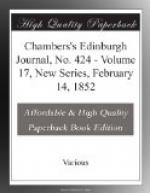——’the
marvellous boy,
The sleepless soul that perished
in his pride,’
had already given proofs of his wondrous precocity; the genuine sailor-poet, Falconer, had lately published The Shipwreck; Laurence Sterne had just collected the materials for his Sentimental Journey; Sir William Blackstone had published his celebrated Commentaries; Wesley and Whitefield had not yet ended their useful career; the star of Edmund Burke was rising; and Jeremy Bentham, being then (1766) but seventeen years of age, had taken his master’s degree at Oxford, although, it is true, the first literary performance of the eccentric philosopher did not appear till some years later. Home, Moore, and Colman, had appeared successfully as dramatists, and were about to be followed by Macklin, Cumberland, Goldsmith, and Sheridan. Newcastle or district celebrities of the time included Mark Akenside, the author of The Pleasures of the Imagination; Dr Thomas Percy, dean of Carlisle, who published, in 1765, his Reliques of English Poetry; and Dr John Langhorne, a northern divine of no small popularity in his day as a poet. Among other illustrious living men, were Horace Walpole, Henry Mackenzie, Blair, Hume, Adam Smith, Dr Robertson, Garrick, Reynolds; and last, not least, William Pitt, who, in 1766, was created Earl of Chatham.
But let us return to our more immediate purpose—that of making a few selections from the Chronicle, some of which will doubtless reflect far less credit on the age than the enumeration we have just made of eminent individuals. Now and then, a duel took place in Hyde Park. The amusements of some of our aristocrats did not always exhibit them in any very dignified position, as witness the subjoined:—’Sir Charles Bunbury ran 100 yards at Newmarket for 1000 guineas, against a tailor with 40 lb. weight of cabbage, alias shreds.’
Here is a paragraph, from the number for March 15, 1766, relative to the recreations of some less elevated in the social scale: ’Sunday morning, a little before three o’clock, a match at marbles was played under the piazza at Covent Garden by the light of thirty-two links (by several rogues well known in that circle), for twenty guineas a side.’
A few other quotations may be deemed worthy of republication, although some of them may have no direct or important bearing. The audacity of highway robbers at this period is known to everybody. The following, dated December 21, 1765, gives a tolerably correct idea of the usual style adopted by those gentlemen of the road:—’Thursday, the Leeds and Leicester stage-coaches were stopped on Finchley Common by a highwayman, who took from the passengers a considerable sum of money. A nobleman’s cook, a young woman about twenty-five, declared she would not be robbed, when the highwayman, admiring her courage, let her alone. He broke the coach-glass with his pistol, and gave the coachman half-a-crown to get it mended.’ News from London, dated January 9, 1765, says: ’Early on Tuesday morning, a member of parliament, on his return home in a chair to his house in New Palace Yard, was stopped and robbed by a single footpad of his purse, in which were sixty-three guineas.’




